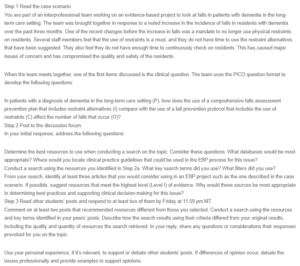Researching and Recommending Evidence-Based Research Resources
Best Resources
The best resources to use when searching for the topic include PubMed/MEDLINE, CINAHL, and the Cochrane Library (Pollock et al., 2021). PubMed is a commonly used database that has a wealth of biomedical literature. It is the key starting point for comprehensive searches associated with healthcare and medical topics. Secondly, the Cumulative Index Nursing and Allied Health Literature (CINAHL) is a dedicated database of nursing and allied health literature. It is specifically useful in looking for evidence related to nursing intervention and patient care. Lastly, the Cochrane Library provides meta-analyses and systemic reviews and meta-analyses, offering a high evidence level. This particular database is well-versed in a rigorous review process, making it a key resource for evidence-based practice (Pollock et al., 2021).
Search Terms and Filters
Search terms include Dementia AND falls prevention, Long-term care AND evidence-based practice, Fall prevention protocol, AND dementia, Restrain alternatives AND long-term care, and Comprehensive falls assessment plan.
Filters include the studies restricted to the past 5 years and study types limited to randomized controlled trials, meta-analyses, and focus on systematic reviews.
Articles
Schoberer, D., Breimaier, H. E., Zuschnegg, J., Findling, T., Schaffer, S., & Archan, T. (2022). Fall prevention in hospitals and nursing homes: Clinical practice guideline. Worldviews on Evidence-Based Nursing, 19(2). https://doi.org/10.1111/wvn.12571
Rationale: Clinical practice guidelines provide recommendations based on a synthesis of evidence, which makes them key in informing practice (Sargeant et al., 2022).
Bhasin, S., Gill, T. M., Reuben, D. B., Latham, N. K., Ganz, D. A., Greene, E. J., Dziura, J., Basaria, S., Gurwitz, J. H., Dykes, P. C., McMahon, S., Storer, T. W., Gazarian, P., Miller, M. E., Travison, T. G., Esserman, D., Carnie, M. B., Goehring, L., Fagan, M., & Greenspan, S. L. (2020). A Randomized Trial of a Multifactorial Strategy to Prevent Serious Fall Injuries. New England Journal of Medicine, 383(2), 129–140. https://doi.org/10.1056/nejmoa2002183
Rationale; randomized Clinical Trials are key in assessing the effectiveness of particular interventions (Sargeant et al., 2022).
Groot Kormelinck, C. M., Janus, S. I. M., Smalbrugge, M., Gerritsen, D. L., & Zuidema, S. U. (2020). A systematic review on barriers and facilitators of complex interventions for residents with dementia in long-term care. International Psychogeriatrics, 1–17. https://doi.org/10.1017/s1041610220000034
Rationale: A systemic review offers a synthesis of existing evidence, providing a comprehensive overview.
References
Sargeant, J. M., Brennan, M. L., & O’Connor, A. M. (2022). Levels of Evidence, Quality Assessment, and Risk of Bias: Evaluating the Internal Validity of Primary Research. Frontiers in Veterinary Science, 9. https://doi.org/10.3389/fvets.2022.960957
Pollock, D., Davies, E. L., Peters, M. D. J., Tricco, A. C., Alexander, L., McInerney, P., Godfrey, C. M., Khalil, H., & Munn, Z. (2021). Undertaking a Scoping Review: a Practical Guide for Nursing and Midwifery Students, Clinicians, Researchers, and Academics. Journal of Advanced Nursing, 77(4), 2102–2113. https://doi.org/10.1111/jan.14743
ORDER A PLAGIARISM-FREE PAPER HERE
We’ll write everything from scratch
Question
Step 1 Read the case scenario.
You are part of an interprofessional team working on an evidence-based project to look at falls in patients with dementia in the long-term care setting. The team was brought together in response to a noted increase in the incidence of falls in residents with dementia over the past three months. One of the recent changes before the increase in falls was a mandate to no longer use physical restraints on residents. Several staff members feel that the use of restraints is a must, and they do not have time to use the restraint alternatives that have been suggested. They also feel they do not have enough time to continuously check on residents. This has caused major issues of concern and has compromised the quality and safety of the residents.

Researching and Recommending Evidence-Based Research Resources
When the team meets together, one of the first items discussed is the clinical question. The team uses the PICO question format to develop the following questions:
In patients with a diagnosis of dementia in the long-term care setting (P), how does the use of a comprehensive falls assessment prevention plan that includes restraint alternatives (I) compare with the use of a fall prevention protocol that includes the use of restraints (C) affect the number of falls that occur (O)?
Step 2 Post to the discussion forum.
In your initial response, address the following questions:
Determine the best resources to use when conducting a search on the topic. Consider these questions: What databases would be most appropriate? Where would you locate clinical practice guidelines that could be used in the EBP process for this issue?
Conduct a search using the resources you identified in Step 2a. What key search terms did you use? What filters did you use?
From your search, identify at least three articles that you would consider using in an EBP project such as the one described in the case scenario. If possible, suggest resources that meet the highest level (Level I) of evidence. Why would these sources be most appropriate in determining best practices and supporting clinical decision-making for this issue?
Step 3 Read other students’ posts and respond to at least two of them by Friday at 11:59 pm MT.
Comment on at least two posts that recommended resources different from those you selected. Conduct a search using the resources and key terms identified in your peers’ posts. Describe how the search results using their criteria differed from your original results, including the quality and quantity of resources the search retrieved. In your reply, share any questions or considerations their responses provoked for you on the topic.
Use your personal experience, if it’s relevant, to support or debate other students’ posts. If differences of opinion occur, debate the issues professionally and provide examples to support opinions.

